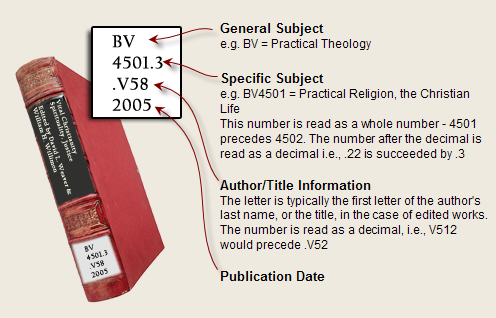วันศุกร์ที่ 30 กันยายน พ.ศ. 2554
วันศุกร์ที่ 16 กันยายน พ.ศ. 2554
Chapter 3
Source of Knowledge : Libraries
source : http://geography.about.com/library/congress/bllc.htm

source of the picture : http://www.bc.edu/libraries/help/howdoi/howto/booksonshelf.html
Dewey Decimal Classification (DDC)
The Dewey Decimal Classification (DDC, also called the Dewey Decimal System) is a proprietary system of library classification developed by Melvil Dewey in 1876.
It has been greatly modified and expanded through 23 major revisions, the most recent in 2011. This system organizes books on library shelves in a specific and repeatable order that makes it easy to find any book and return it to its proper place. The system is used in 200,000 libraries in at least 135 countries.
source : http://en.wikipedia.org/wiki/Dewey_Decimal_Classification

source of the picture : http://lrc.sierracollege.edu/searchpath/glossary/callnumber-pop.html
Library of Congress Classification System (L.C.)
The Library of Congress Classification System (LC System) is used to organize books in many academic and university libraries throughout the United States and world.source : http://geography.about.com/library/congress/bllc.htm

source of the picture : http://www.bc.edu/libraries/help/howdoi/howto/booksonshelf.html
Dewey Decimal Classification (DDC)
The Dewey Decimal Classification (DDC, also called the Dewey Decimal System) is a proprietary system of library classification developed by Melvil Dewey in 1876.
It has been greatly modified and expanded through 23 major revisions, the most recent in 2011. This system organizes books on library shelves in a specific and repeatable order that makes it easy to find any book and return it to its proper place. The system is used in 200,000 libraries in at least 135 countries.
source : http://en.wikipedia.org/wiki/Dewey_Decimal_Classification

source of the picture : http://lrc.sierracollege.edu/searchpath/glossary/callnumber-pop.html
วันพุธที่ 7 กันยายน พ.ศ. 2554
Chapter 2
Objective and Subjective
Objective means that you look at a matter without bias. You just take the facts into account without any outside opinions involved. Meanwhile, subjective means that along with facts you put personal opinions and feeling into an agreement.This may then make your agreement bias and in turn even invalid.
Example of Objective: He studied hard and turned in all his works, that are the reason why he got all A this semester. This is the fact that because he studies hard and he deserves all A.
Example of Subjective: Mint looks pretty today.This is someone opinion that thinks that Mint looks pretty, maybe it's not true.
วันอาทิตย์ที่ 4 กันยายน พ.ศ. 2554
Chapter 1
Data, Information, Knowledge, and Wisdom
Computers are often called data processing machines or information processing machines. People understand and accept the fact that computers are machines designed for the input, storage, processing, and output of data and information
Computers are often called data processing machines or information processing machines. People understand and accept the fact that computers are machines designed for the input, storage, processing, and output of data and information
Data
- information, often in the form of facts or figures obtained from experiments or surveys, used as a basis for making calculations or drawing conclusions
- information, for example, numbers, text, images, and sounds, in a form that is suitable for storage in or processing by a computer
Information
- definite knowledge acquired or supplied about something or somebody
- the collected facts and data about a particular subject
- a telephone service that supplies telephone numbers to the public on request.
- the communication of facts and knowledge
- computer data that has been organized and presented in a systematic fashion to clarify the underlying meaning
- a formal accusation of a crime brought by a prosecutor, as opposed to an indictment brought by a grand jury
Knowledge
- general awareness or possession of information, facts, ideas, truths, or principles
- clear awareness or explicit information, for example, of a situation or fact
- all the information, facts, truths, and principles learned throughout time
- familiarity or understanding gained through experience or study
Wisdom
- the knowledge and experience needed to make sensible decisions and judgments, or the good sense shown by the decisions and judgments made
- accumulated knowledge of life or in a particular sphere of activity that has been gained through experience
- an opinion that almost everyone seems to share or express
- ancient teachings or sayings
สมัครสมาชิก:
ความคิดเห็น (Atom)
